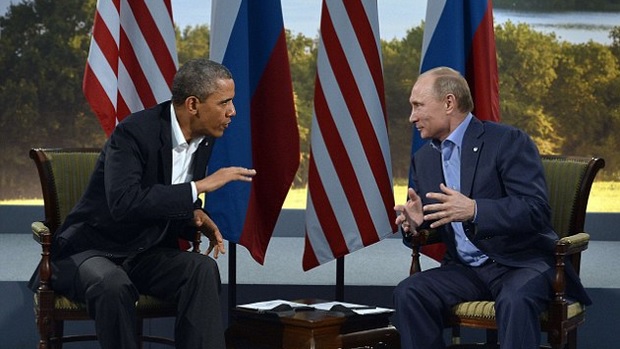The Syrian peace process is clearly in a state of stagnation, yet it has seen a number of dramatic developments involving Russia and the US which could potentially bring about a diplomatic breakthrough. Over the last few days, Russia has significantly increased its deployment of military specialists to its naval facility in Tartus and reportedly to Latakia. According to satellite imagery and statements by US officials, Moscow has also sent a significant amount of military hardware, including over twenty fighter jets, to Syria.
The White House was clearly taken by surprise by Russia’s quick and assertive military movements in Syria. Following reports of a Russian military build-up in the country, US Secretary of State John Kerry called Russian Foreign Minister Sergey Lavrov. Kerry expressed his concern that Russian actions in Syria could escalate the conflict and lead to confrontation with the US-led coalition that is fighting ISIS.
The US position on Syria has remained unchanged throughout the conflict. The White House argues that Bashar Al Assad has lost all legitimacy and must leave office. Yet starting in 2015, the international media has started to note that the tone of rhetoric regarding the Syrian President has changed.
It looks as if the US position on Assad has somewhat softened since Russia stepped up its military presence in Syria. John Kerry continues to state that the Syrian President must go, yet the timing is negotiable. “It doesn’t have to be on day or month one,” he recently said. But the most significant of John Kerry’s comments came when he expressed hope that Russia would bring Bashar Al Assad to the negotiating table, something the US was previously against. While the US State Department spokesman has repeated publicly in his statements that Washington’s position on Syria has not changed, it does seem that the country has become “more receptive” to Russia’s arguments, as Sergey Lavrov put it on Wednesday.
While John Kerry has played a pivotal role in trying to negotiate with his Russian counterpart on Syria, including on issues of a military nature, it turns out that Pentagon was sidelined on discussions with Moscow.
Despite initial reports of a Russian military build-up appearing in the media in mid-August, there were no contacts between the defense chiefs of the two countries for over a month following. A remarkable change took place on September 18th when US Secretary of Defense Ashton Carter called Defense Minister Sergey Shoigu to discuss Russia’s military movements in Syria.
The renewal of contacts between the two militaries is a significant event considering that almost all military communication channels have remained closed as a result of the Ukraine crisis. It is unlikely that reengagement with the US Department of Defense was the endgame of the Russian military build-up in Syria, yet the fact that the two highest-ranking defense officials are now continuously in touch means that there is a chance that Moscow and Washington will begin to coordinate their actions in Syria.
Another event that did not get much coverage in the media, yet reveals how Vladimir Putin’s bold moves in Syria are changing the dynamic of US-Russia relations, was the visit of a CIA delegation to Moscow last week. According to Build Am Sonntag’s sources, the delegation met with the Russian Foreign Intelligence Service (SVR) and agreed to some level of coordination in Syria.
The renewal of military-to-military and intel-to-intel contacts between Moscow and Washington means that there will be much less finger-pointing and reliance on dubious political guesswork from now on. Russia’s moves in Syria as well as general tensions in the bilateral relations may lead to a meeting between Barack Obama and Vladimir Putin on the sidelines of the UN General Assembly.
While neither side has confirmed these reports, quite a few media outlets in Russia and the US have quoted sources saying that such a meeting is in the works. Over the last two years, Obama and Putin have had only passing encounters, so their one-on-one talks is a breakthrough in itself.
If the meeting takes place, Vladimir Putin will certainly try to persuade Obama that his Syria plan is the only option that can work and that it will help the US-led coalition in Syria to save face.
By uniting forces with the existing coalition, Moscow wants to prove to the West that it is wholeheartedly determined to defeat the Islamic State and that it is impossible to reach peace in Syria without Russia’s participation. The endgame here is likely to prove to the West that isolating Russia is counterproductive.
The current dynamic is not similar to a real thaw in relations and it will certainly not lead to a new “reset.” Much depends on the outcome of Vladimir Putin’s speech and subsequent meetings in New York.
The current situation in Syria is similar to what we saw in 2013 when Russia and the United States managed to resolve the issue of Syrian chemical weapons diplomatically. Moscow, however, should be wary of its current tactic because “forcing” the White House into cooperation on Syria does not result in building more trust.







